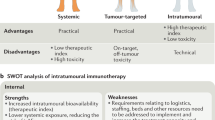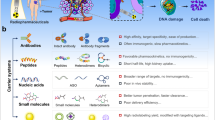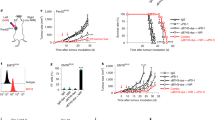Abstract
Antibodies directed against tumour associated antigens provide a means for delivering preferentially cytotoxic radionuclides to the cells of primary and secondary tumours. The factors that influence the effectiveness of the radiation in the tumour compared with its effect on the radiosensitive normal tissues include the specificity of the antibody, the distribution of targeted energy within the tumour and the host's response to the injected foreign antibody. Recently some encouraging results from clinical trials of radioimmunotherapy have been reported in the literature. There is a continual search for more avid and specific antibodies, and the techniques of genetic engineering are being applied to the problem of reducing the antigenicity and mass of the carrier antibody. The improved efficiency of the labelled antibody needs to be supplemented by an identification of those tumours most likely to respond to this form of therapy.
This is a preview of subscription content, access via your institution
Access options
Subscribe to this journal
Receive 24 print issues and online access
$259.00 per year
only $10.79 per issue
Buy this article
- Purchase on Springer Link
- Instant access to full article PDF
Prices may be subject to local taxes which are calculated during checkout
Similar content being viewed by others
Rights and permissions
About this article
Cite this article
Cobb, L., Humm, J. Radioimmunotherapy of malignancy using antibody targeted radionuclides. Br J Cancer 54, 863–870 (1986). https://doi.org/10.1038/bjc.1986.254
Issue Date:
DOI: https://doi.org/10.1038/bjc.1986.254
This article is cited by
-
Radio-immunotherapy dosimetry with special emphasis on SPECT quantification and extracorporeal immuno-adsorption
Medical & Biological Engineering & Computing (1994)
-
Radioiodinated anti-hepatocellular carcinoma (HCC) ferritin Targeting therapy, tumor imaging and anti-antibody response in HCC patients with hepatic arterial infusion
Journal of Cancer Research and Clinical Oncology (1992)
-
Quantitative measurement of uptake of radiolabeled monoclonal antibody by means of planar data
Annals of Nuclear Medicine (1991)
-
Antibody mediated targeting of radioisotopes, drugs and toxins in diagnosis and treatment
The Indian Journal of Pediatrics (1990)



